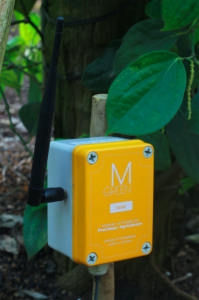Leveraging the Internet of Things: Precision Agriculture in Vietnam
What if your crops could talk to you, telling you how much water they needed? What if they relayed information through sensors and data in a way that took much of the guesswork out of farming? That’s what entrepreneur Tri Nguyen is doing through MimosaTEK, a small and growing business in Vietnam, by trying to transform farming operations in the country in a way that is environmentally and economically sustainable, and that improves farmers’ household incomes.
Over- or under-irrigating crops reduces crop yield and can lead to diseases that harm sensitive plants. Yet many farmers in Vietnam do not have a reliable way to understand crop needs or how to optimize their farm operations. On top of that, in some provinces like Gia Lai, water resources are shrinking, leaving a depleted supply that makes it more difficult to make it through each dry season. At the same time, the Gia Lai Province heavily relies on its water resources, as it accounts for 1/6th of Vietnam's pepper production, with the country being the largest pepper producer in the world.
Nguyen thought there had to be a better way to farm after his own dive into agriculture. When he left a C-suite position at a large corporation in Vietnam to start a farm in Dalat, he saw and experienced first-hand how much more farmers have to learn about their crops, and thought there should be a better way to get real feedback from the plants themselves.
This is where the Internet of Things comes in – the vision for which is that of a world in which sensors and digital technology are constantly communicating with each other to collect and share data.
While this vision holds some real security concerns, some agtech entrepreneurs believe it could improve agriculture and meet major societal needs.

Nguyen and his co-founders built a prototype based on the Internet of Things concept and tested it on a few customers in 2015. While the product was still improved, customers generally gave positive feedback. And it launched the MimosaTEK team on a journey to educate farmers on precision agriculture and have them adapt this precision management solution, called MGreen. It is an Internet of Things platform for precision agriculture to help farmers increase productivity while minimizing expenses and mitigating risks. The sensors in hardware devices continuously measure environmental parameters; and the algorithm do the computation to recommend to farmers the optimal irrigation schedule. The team now consists of 23 employees, and they’re seeking to expand their operations.
But change is hard. Farmers are typically hesitant to adapt new technology, and are more likely to rely on methods that might be less efficient, but that they believe to be reliable.
And this has proven to be one of MimosaTEK’s greatest challenges so far. To tackle this, though, the team has held several workshops and events to equip farmers with agronomic knowledge on better irrigation practices, as well as on how to use MimosaTEK products. To incentivize farmers trying to use the product, MimosaTEK also offers a leasing model.
MimosaTEK customers have indicated that the products have helped them save as much as 30% on water and electricity to irrigate their farms, and increased their yields by up to 25%. At the same time the product adds value to farmers cooperative management as they can use the software to manage the standard of agricultural produces from the members.
Reducing water and electricity waste is an important part of tackling climate change, and creating a culture of production that is responsible and sustainable. In addition, by increasing farm yields, MimosaTEK products have the potential to help meet the food needs of a growing population.
While there is still a long way to go, but Nguyen says, “Our passion for agriculture and our dream to enhance farmers’ lives motivate us to keep going, even when things are difficult. We believe that technology is the only solution to improve crops yield and sustainable agriculture when the farmers are facing serious impacts of climate change, scarcity of resources such as water, electricity, and labor. If we do not take action now, the changes will never be realized.”

MimosaTEK Team at Dragon Fruit Farm. Photo Creadit: Mimosatek
This article is based on interview questions with MimosaTek. It was conducted and authored by Stephanie Buck, Development and Communications Coordinator at the Aspen Network of Development Entrepreneurs (ANDE) and Mareike Grytz, Knowledge and Communications Manager at the Inclusive Business Action Network (IBAN).
In its journey MimosaTek has been accompanied by different organizations supporting growing businesses in their mission to improve livelihoods, such as the Inclusive Business Action Network (IBAN), the Inclusive Business Accelerator (IBA), and SNV Vietnam.
- This blog is part of a series on what’s new in inclusive agribusiness from April 2017. Hear from more contributors in part one of the series- digging into the details of inclusive business programmes around the world.
- Read more on key topics in inclusive agribusiness in the series of six theme papers.
- Access over 450 resources on inclusive agribusiness on SearchInclusiveBusiness.org